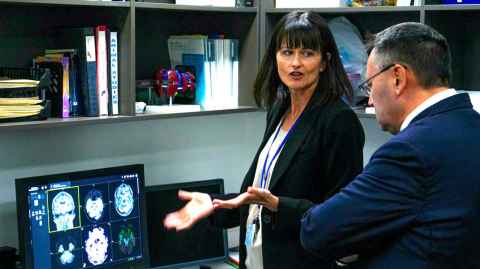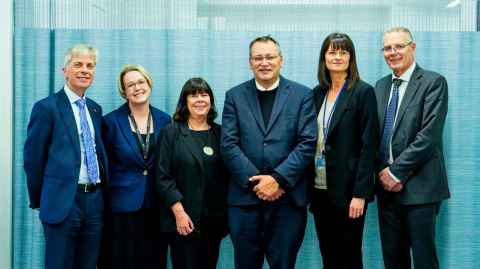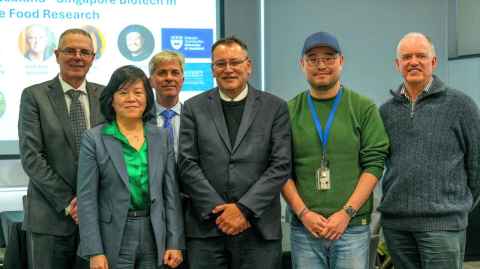Research collaborations awarded more than $7m from Catalyst programme
24 July 2025
Two groundbreaking research projects from the University have been successful in the Singapore-New Zealand Catalyst programme funding round.

Two pioneering research initiatives from the University of Auckland, tackling challenges in sustainable food innovation and healthy ageing, have been awarded significant joint funding under the 2025 Catalyst: Strategic New Zealand–Singapore Research Programme.
Together, the two projects will receive over NZ$7 million in combined funding to advance research with meaningful health, economic and environmental outcomes. The programme is jointly administered by New Zealand’s Ministry of Business, Innovation and Employment (MBIE) and Singapore’s National Research Foundation (NRF).
The Hon Dr Shane Reti, Minister of Science, Innovation and Technology met with the researchers at the Centre for Brain Research at the University’s Grafton campus. He said: “Science and innovation are critical to building a high-growth, high-value economy. That’s why we’re investing in research with a clear line of sight to commercial outcomes and real public benefit.”
Vice-Chancellor Professor Dawn Freshwater said, “These research teams deserve congratulations for their innovative approach to two persistent challenges for society, our ageing population and enhancing sustainability in our food systems.”
Deputy Vice-Chancellor Research and Innovation, Professor Frank Bloomfield said the funding and research collaborations with Singapore highlighted the innovation and excellence of research from the University in two of the areas in which we have a global reputation. “Working closely with leading researchers internationally benefits both parties and our respective countries and leads to more impactful research.”

AI-Driven Dementia Risk Prediction Model to Transform Clinical Practice
- NZD $4,000,000 (New Zealand)
- SGD $1,326,520 (Singapore)
This transdisciplinary project will create an explainable AI tool that integrates brain scans, blood biomarkers, cognitive test results and clinical data to predict an individual’s risk of developing dementia. The tool will be tested in Singaporean and New Zealand populations using large, longitudinal datasets. Working with Siemens Healthcare and Dex-Lab, the AI model will be integrated into a browser-based clinical tool designed for real-world deployment.
The New Zealand lead is Professor Lynette Tippett, Science, with co-PIs Dr Catherine Morgan, Dr Katerina Taskova (UoA), Dr Narun Pat (University of Otago), and collaborators from the University of Otago and University of Canterbury.
The Singapore lead is Assistant Professor Saima Hilal, National University of Singapore, in collaboration with co-PIs from NUS and Dex-Lab Pte Ltd, including Associate Professor Christopher Chen, Assistant Professor Swapnil Mishra, and Associate Professor Mengling Feng.

Sustainable Functional Foods from Bio-Fermented Cellulose and Mycelium Biomass
- NZD $3,000,000 (New Zealand)
- SGD $1,249,950 (Singapore)
This innovative project aims to transform fruit and agricultural residues into high-value, health-promoting food products using bacterial cellulose (BC) and mushroom-derived mycelium biomass (MB). The bio-fermented materials will be formulated into snack bars, beverages, and vegan meat alternatives.
Collaborators include Kombucha Bros Ltd, Atutahi (Kiwi Kai Ltd), and Mycrocell Pte Ltd. The project also integrates Vision Mātauranga, with direct engagement of Māori food producers and use of native New Zealand botanicals such as horopito and kawakawa.
The New Zealand lead is Professor Siew-Young Quek, Science, with co-PIs Professor Paul Kilmartin, Dr Shan Yi, Dr Rebecca Deed, and Dr Billy Yi Yang, and collaborators from Massey University and the Malaghan Institute.
The Singapore lead is Associate Professor Du Juan, Singapore Institute of Technology (SIT), partnering with researchers from A*STAR’s Bioprocessing Technology Institute (BTI) and Singapore Institute of Food and Biotechnology Innovation (SIFBI).
About the Catalyst Fund
The Catalyst: Strategic programme strengthens international research partnerships by supporting projects that deliver high-impact science with global relevance. For 2025, the New Zealand–Singapore programme focuses on: Leveraging AI for Healthy Ageing, Biotech in Future Foods.
Media contact: mediateam@auckland.ac.nz